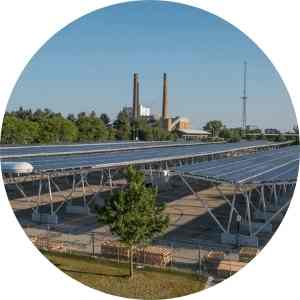Sustainable facilities
At MSU, our buildings, operations and landscape reflect our values of stewardship and high-performance. With 5,200 acres of contiguous campus to work with, Spartans work every day to enhance our efficiency, grow our greenspace, conduct critical research and innovate with sustainable projects.MSU GARDENS
The gardens that blanket Michigan State University's 5,200 acre campus are a special part of the Spartan experience. They are not just beautiful spaces to relax, but serve as a living learning laboratory for studying diverse plant species and are a key component of a sustainable university. Learn about the many gardens at MSU, including those at the main campus and around the state of Michigan.
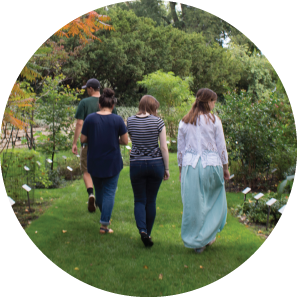
BAILEY GREENHOUSE & STUDENT ORGANIC FARM
Formed in 1999 by a group of MSU students, the Student Organic Farm (SOF) provides a place where students can volunteer, work, visit and learn about sustainable agriculture and farming techniques. Constructed in 2012, the Bailey GREENhouse & Urban Farm is a unique hoophouse located at Bailey Residential Hall. It offers a similar experience as the SOF, but is more accessible to first-year students, especially those in the Residential Initiative on the Study of the Environment (RISE) program.
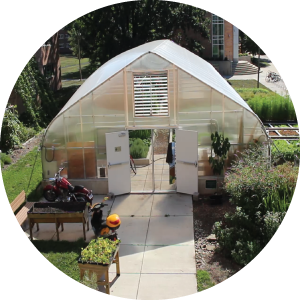
RECYCLING CENTER AND SURPLUS STORE
The Recycling Center, located just off Farm Lane on South Campus, houses MSU's very own Material Recovery Facility (MRF), where recycled materials from all across campus are sorted into bales that are then sold to end users for the manufacture of products. Also housed in the building is the MSU Surplus Store, where materials collected from campus buildings and the MSU community are sold back to the public, giving new purpose to old items. A LEED certified building, the Recycling Center offers unique tours. Learn more.
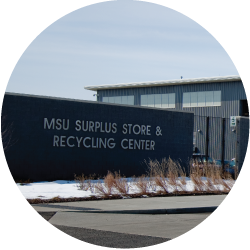
RED CEDAR RIVER
In addition to serving a critical purpose in the fight song, the Red Cedar River is a unique and beautiful landmark on MSU's campus. Supporting a variety of wildlife, from fish, to micro-organisms, to the famous ducks, the river is an integral part of campus culture. Learn more about the Red Cedar River Watershed, and take the Campus Stormwater Walking Tour to see how MSU employs sustainable tactics to protect the riverbank and keep chemicals out of the river.
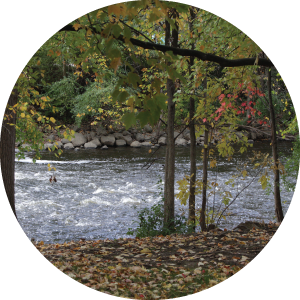
LEED CERTIFIED BUILDINGS
In 2009, MSU received its first Leadership in Energy and Environmental Design (LEED) award, earning a silver certification for the construction of an addition to the Chemistry Building. On campus, numerous other buildings have earned LEED certification, and all new construction and major renovation projects follow LEED standards. These guidelines include reuse of materials, recycling on construction waste and more.
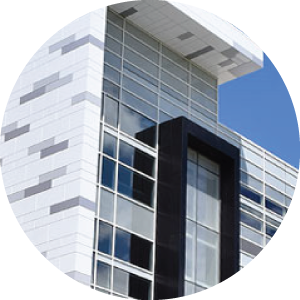
SOUTH CAMPUS ANAEROBIC DIGESTER
Completed in 2013, the South Campus Anaerobic Digester is a sealed tank, deprived of oxygen, which intakes organic waste and converts it into usable fuel when heated. Taking waste from places like the MSU Dairy Teaching and Research Center and campus dining halls, the digester diverts about 17,000 tons of organic waste every year. It generates enough energy to power 10 buildings on South Campus, the equivalent of powering between 250 and 300 homes.
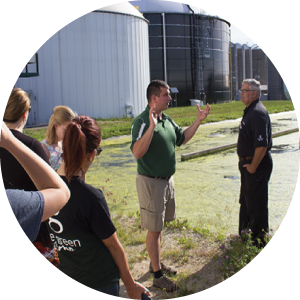
STUDENT SOLAR TABLE
Located in the South Campus Courtyard, the solar-powered picnic table provides students, faculty, staff and visitors with a unique studying space outside. With features like a solar roof and charging outlets, the table balances enjoying the outdoors with accessibility for meeting, studying and working. Proposed and executed by the Sustainable Spartans, an MSU student group, the project is also an example of student collaboration and innovation.
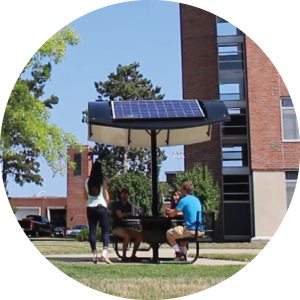
MSU SOLAR CARPORTS
MSU’s commitment to renewable energy takes shape in the solar carports that span across five parking lots on the southern end of campus. The solar carports, operational since December of 2017, are designed to deliver an annual energy of 15 million kilowatt-hours to the university and operate on a peak power of 10.5 Megawatts. This energy is equivalent to powering 1,800 Michigan homes. The carports were built to accommodate both snow plowing and vehicles for tailgating. To learn more about solar energy and the power purchase agreement for it, visit MSU Infrastructure and Planning Facilities.
Video courtesy of Robert Goodwin - RS&GIS, MSU
